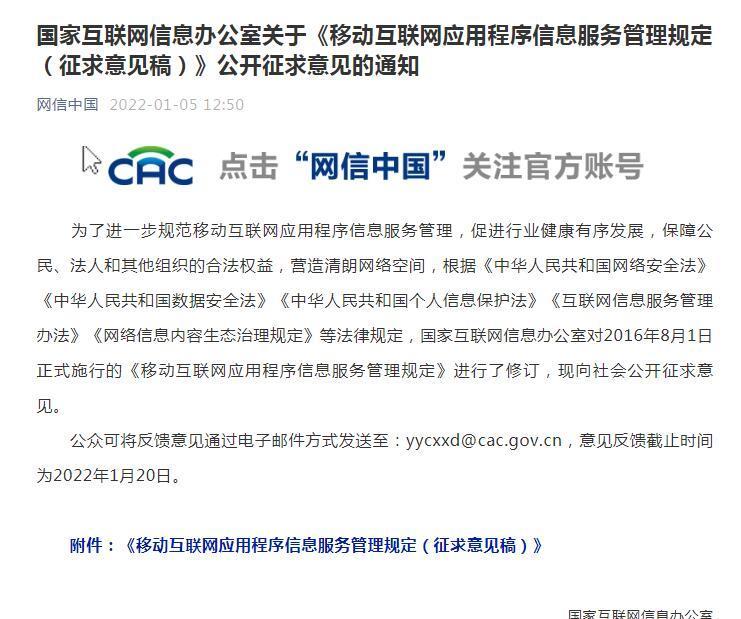
Screenshot of the WeChat public account of the State Internet Information Office "Netinfo China"
According to the WeChat public account of the State Internet Information Office "Netinfo China", the State Internet Information Office today issued a notice for public comment on the "Provisions on the Administration of Information Services for Mobile Internet Applications (Draft for Solicitation of Comments)".
The Draft for Comments proposes that where an application provides users with services such as information release and instant messaging, it shall conduct authentic identity information authentication for users applying for registration based on methods such as mobile phone numbers, ID card numbers, or unified social credit codes. Where users do not provide real identity information, or fraudulently use the identity information of organizations or others for false registration, they must not be provided with relevant services.
Application providers shall establish and complete information content review and management mechanisms, establish and improve management measures such as user registration, account management, information review, routine inspections, and emergency response, and allocate professionals and technical capabilities appropriate to the scale of services. For registered users who violate relevant laws and regulations and service agreements, the application provider shall, in accordance with the law, employ disposal measures such as warnings, restricting functions, and closing accounts, and keep records and report to the relevant competent departments.
In addition, application providers shall standardize their operation and management behaviors, and must not use false publicity, bundled downloads, etc., or use illegal and negative information to induce users to download, and must not use machine or manual means to brush lists, brush quantities, control evaluations, and create false traffic.
Engaging in application personal information processing activities shall follow the principles of legality, propriety, necessity, and good faith, have a clear and reasonable purpose and disclose processing rules, comply with relevant provisions on the scope of necessary personal information, standardize personal information processing activities, take necessary measures to ensure the security of personal information, must not compel users to agree to non-essential personal information handling behavior for any reason, and must not refuse users to use their basic functional services because users do not agree to provide non-essential personal information.
The Draft for Comments also proposes that application providers should adhere to the principle of being most beneficial to minors, pay attention to the healthy growth of minors, perform all obligations for the protection of minors' networks, strictly implement the requirements for real-name registration and login of minor user accounts, and must not provide minor users with relevant products and services that induce their addiction in any form.